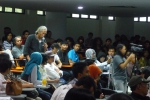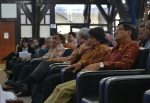Studio Seminar Regarding the Agrarian Reformation Development Policy
By Adi Permana
Editor Adi Permana

BANDUNG, itb.ac.id – Agrarian reform is defined as the measures to restructure and redistribute ownership or claims of agricultural land, as well as the use of agrarian resources to improve people's welfare (Lipton, 2009).
The policies concerning agrarian reformations were discussed at the online studio seminar held by the SAPPK ITB Master's Program in Development Studies on Monday (12/27/2021). Three agrarian reform case studies were presented, illustrating the livelihoods of farmers from three different villages of Garut.
This seminar was attended by Usep Setiawan S.Sos, M.Si (Chief Expert of the RI Presidential Staff Office), Drs. Dalu Agung Darmawan, M.Si (Head of the National Land Agency of West Java Province) and Noer Fauzi Rachman, Ph.D. (Head of the National Land Agency of Garut; agrarian reform specialist). Other guests include the Head of Cipangramatan, Sukawargi, and Wanakerta Village as representatives of their respective villages.
The first study was the "Review on the Implementation of Agrarian Reformation and Its Impact on Farmers' Welfare". In 2016, the agenda was executed at Cipangramatan Village and became a source of interest for researching the impact of the agrarian reformation on the welfare of farmers in the village. The study revealed that interventions- in the context of structural and procedural transformation- are needed to protect susceptibilities via policies.
Next, the Sukawargi Village case study was shown. This village is one of the pilot projects of Indonesia’s government in regulating assets and land accesses. The research titled "Implementation of Agrarian Reformation Policy on Farmers' Welfare" evaluated the capability of the programs in providing equitable assets and accesses to benefit the farmers.
The final presentation was the research with the topic "Sustainable Welfare Analysis of Agricultural Sector at Wanakerta Village, Cibatu". Unlike the two previous research, Wanakerta Village is not part of the agrarian reform's prioritized agenda; this research focuses instead on outlining the well-being of farmers' households and the vulnerability of agricultural sustainability.
Overall, the three research indicated that agrarian reformation provides a sense of security in land ownership for farmers. However, recipients of TORA (Agrarian Reformed Land) in Cipangramatan and Sukawargi Village had not felt any significant material benefits.
From the results, researchers formulated several recommendations on revising the current policies. These policies were classified into three types: capital and marketing, internal village associations, and agrarian reformation associations.
"Whether agrarian reform practices are present or absent, agricultural accesses in creating a sustainable development is still a major challenge that should be dealt swiftly so that farmers can have better lives and the current global crisis can be tackled," Ismal Muntaha, one of the researchers involved, stated.
Reporter: Achmad Lutfi Harjanto (Perencanaan Wilayah dan Kota, 2020)
Translator: Ruth Nathania (Teknik Lingkungan, 2019)

.jpg)
.jpg)
.jpg)
.jpg)
.jpg)


